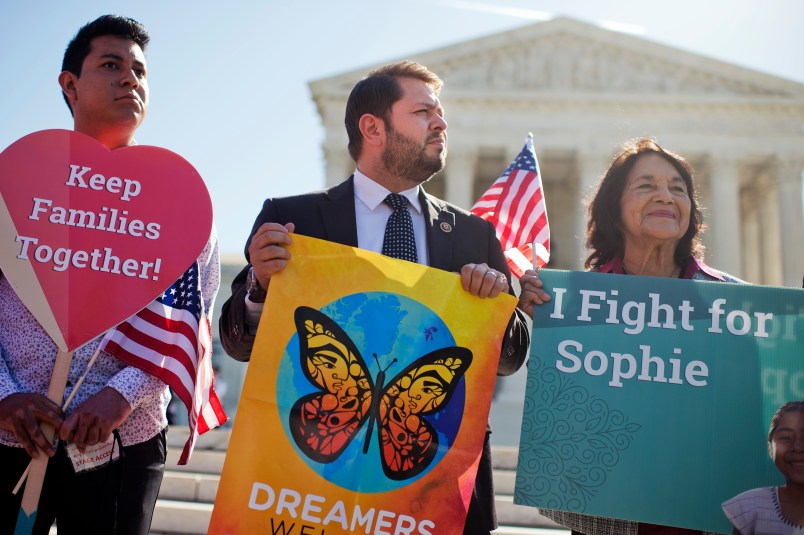The Senate is slated to begin a floor debate early next week on some kind of an immigration bill, though what exactly will be included in that bill remains a mystery. Lawmakers meeting nearly every day to hammer out a compromise say they have yet to reach consensus on any piece of the puzzle, from how many young immigrants known as Dreamers will be granted a path to citizenship to how much funding will go to building new walls on the U.S.-Mexico border to what changes, if any, will be made to the nation’s legal immigration system. Amid this tangle of issues, several senators have told TPM, one piece has emerged as particularly difficult: the status of Dreamers’ parents.
“That’s where I think most of the disagreement comes from,” Sen. Mike Rounds (R-SD) told reporters. “If you’re going to have the DACA kids addressed, you’re going to have to find a way to address the parents. And you cannot simply say, ‘Well, since you brought your kids in illegally, this gives you a leg up on all the millions of other people who are in line waiting to get in here who have not violated the law. That’s the issue.”
The nearly 800,000 young immigrants who have been enrolled in President Obama’s Deferred Action for Childhood Arrivals (DACA) program have never been able to sponsor any family members for legal status or citizenship. But if DACA holders are allowed to obtain green cards and eventually citizenship as part of a new immigration reform bill, they may in the future be able to do so.
Many Democrats and Republicans alike say they do not want families to be split up, and want to offer the parents some sort of temporary legal status.
“We’re still working on how we deal with their family members,” Sen. Claire McCaskill (D-MO) told TPM as she entered an immigration negotiation meeting Monday night. “I think there’s a consensus that citizenship would not be part of that, for parents who brought them into the country against the law. But we’re working to try to figure out a way to make sure the Dreamers want to stay, because they’re not going to want their parents to be deported.”
But several hardline Republicans in the House and Senate, many of whom also oppose President Trump’s call for a path to citizenship for Dreamers, say extending any form of legal status to parents would be intolerable.
“If you give legal status to the parents it undermines the entire rationale for the DACA program,” said Sen. Tom Cotton (R-AR), who broke his typical hallway silence to hold forth to reporters on the topic. “Children ought not to pay for the crimes of their parents, but surely the parents should pay for the crimes of their parents.”
“The people in the DACA program were brought here as minors through no fault of their own, before the age of accountability,” he added. “I think you can distinguish them from their parents or other illegal immigrants who made the decision to come here themselves.”
In 2014, the Obama administration attempted to implement the Deferred Action for Parents of Americans and Lawful Permanent Residents (DAPA) program, which would have granted temporary legal status to 3.6 million undocumented immigrants who had U.S. citizen children, had it not been blocked by federal courts. While the administration wanted to implement additional measures to protect the parents of DACA recipients, they were legally barred from doing so.
“This was something the DOJ said, in an Office of Legal Counsel memo in 2014, that we could not do through executive action,” said Eric Columbus, the former special counsel to the general counsel at the Department of Homeland Security under President Obama. “We concluded it was something Congress would have to address because adjusting their status would exceed the executive branch’s powers.”
But Congress was unable to address it then, and, so far, appears unable to address it now. As Dreamers face the potential loss of their own legal protections, they have expressed concern that the information they handed over to the government to qualify for the program back in 2012 could be used to target their parents for deportation.
“That is a legitimate fear,” Columbus acknowledged. “It depends on whether the information is still current, and whether they live with their parents. We had language under the Obama administration to prevent information sharing between the benefits side and the enforcement side, to stop UCSIS from sharing that information with ICE. But in September they watered that down a bit so they could do that if they wanted to.”







Hmmm. Let’s ask CPOS Kelly what he thinks we should do with them?
The problem is solving itself. With each passing day that Trump is President, the US becomes a less desirable place to live. Eventually, we’ll become such a shithole they’ll all leave on their own.
Republicans should ask themselves “What would Reagan do?” (grant them amnesty) or never invoke his sainted name again.
Obviously, the answer is to give them some type of legal residency and put them to work in Trump hotels.
One thing is certain. No one should ever trust Trump and hs ICE thugs to not be exuberantly vindictive and punitive. There can be no administrative discretion here. Protect them all
At this rate, Mexico is going to be the country trying to build a wall.